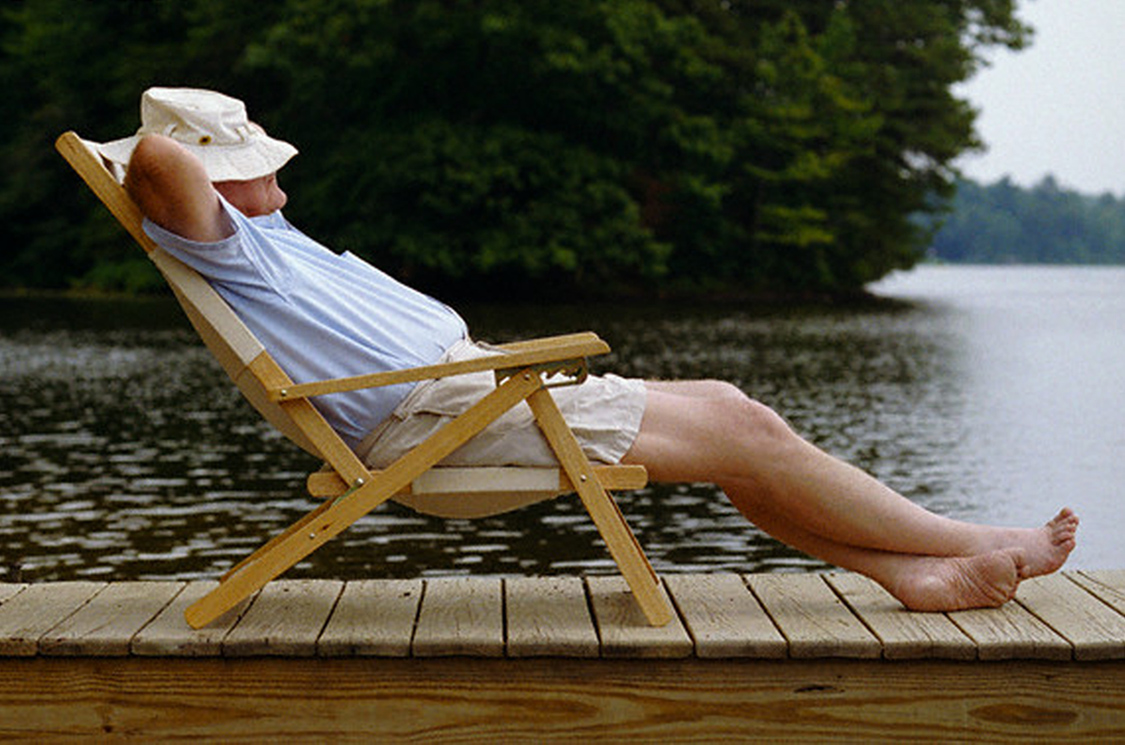
Man Relaxing on Dock — Image by © Barbara Peacock/CORBIS
Few would argue that stress is a growing problem for many Americans. In addition to making us feel bad, research has shown that stress and emotional trauma actually damages our brains and disrupts neuropathways which prevents us from being able to think clearly or respond reasonably to life’s challenges.
Sadly , despite a growing professional consensus which recognizes the importance leisure and non-demand activity for maintaining a healthy brain, many Americans are bogged down by long standing cultural and religious attitudes which disparage leisure by casting it as being lazy or wasting time.
In fact, this anti-self care attitude is exploited by advertising which pushes the hard work ethic. For example, remember the Cadillac advertisement from a few years ago in which a smug rich guy makes fun of Europeans because they take vacations ? The point of the ad was that hard work was the key to success and happiness and that wasting time on vacations was for losers.
Rather than being for losers, new studies show that folks who build leisure into their daily schedule have less stress and out perform those who do not. These results are not surprising when the latest brain science is considered. Specifically, when stress damages the brain, neuropathways which normally connect what we perceive to the higher functioning part of our brain (the pre-frontal cortex) are broken and we are left to cope with distressing situations with only the most primitive part of our brain , the amygdale. As a result, we are unable to think clearly and we often wind up reacting in irrational and exaggerated ways. Emotionally we experience this disconnect as panic or rage. We’ve all witnessed such behavior before, like when the man in the grocery store started yelling and screaming in reactions to a minor frustration.
In order to repair the broken neuro-pathways and restore rational behavior, the brain requires two kinds of rest: Sleep and Non-Demand Activity. These rest activities help the brain to heal and reconnect with itself and allows us to regain our sense of reason, a realistic perspective and self-control over exaggerated impulses.
While we can’t prevent fully control the amount of stress or trauma that we encounter in our lives, those who do not have enough leisure are more vulnerable to its negative effects. Likewise, those who make time for and include leisure in their daily routines both increase their resistance to stress related problems and also accelerate the recovery from the neural damage it causes.
Here are twelve questions to help you determine if you are leisure deficient and some great suggestions to help your brain by increasing its level of non-demand activity.
- Do you sleep well and long enough most nights ?
- Do you pay attention to your stress levels ?
- Do you take stress breaks ?
- Do you practice breathing or other relaxation exercises ?
- Is exercise or aerobic activity a regular part of your day ?
- Do you meditate ?
- Do you write in a journal ?
- Do you have sex frequently ?
- Do you read for fun ?
- Do you listen to music ?
- Do you have a relaxing hobby ?
- Do you go on vacations ?
For more information, here is a great resource to check out: https://lindagraham-mft.net/new-book-bouncing-back/
Rev. Michael Heath , LMHC, Fellow AAPC 3 7 2018



